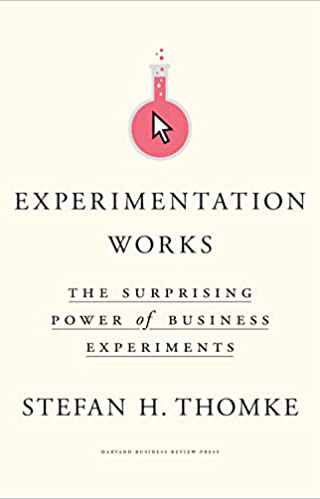When you’re a kid, experimenting comes naturally. You explore with your senses, not just looking and listening but also touching, smelling and even tasting the world around you. You ask questions, test possibilities, take chances.
Some of your experiments work, some don’t. Some even hurt. But if you learn the right lessons, experimenting is how you grow.
Test the Water, Fight the Fear of Failure
But as adults, experimenting can feel like a much riskier business. Trying out a new approach might make things a bit better. Then again, it might also make them worse. And if something ain’t broke… why invite the jeopardy of trying to fix it?
Organizations can’t afford to stand still, though – especially in times of crisis and change. So how can we try out new things and ensure that we learn useful lessons, without putting everything on the line?
Ill-Judged Experiments Can Test You
In many of the places I’ve worked, the approach to innovation has been one of “testing it by doing it.”
Like the time I was at a radio station, where the bosses were determined to make big changes. Unfortunately, they decided to do all their experiments at once. So we recorded new jingles, redid our logo, altered show times, and completely revamped the playlist. But the overall feedback was terrible, and audience figures plummeted.
Not all the results were negative, though. It was just that there was no way to unpick the successes and failures from within all the different things we’d done.
And with no means of pulling back on anything, we just kept pushing forward, making even more changes. That was until enough damage had been done. Before long, the whole station had to be dismantled, and the company was back at square one.
More Lessons in How Not to Experiment
There were similar problems when I worked in elementary schools. There, new ideas about assessment systems, support schemes or teaching styles were often based on people’s instincts, or the desire to chase trends. Then tested on everyone at once.
We had little hope of understanding the impact. We didn’t know how things would have gone if we’d done nothing. And when things didn’t work as hoped, we’d usually come so far from our previous ways of operating that it was impossible to find our way back.
But Sometimes Experimentation Works!
So I picked up “Experimentation Works,” by Stefan H. Thomke, knowing that workplace experiments, actually, often fail. I found even more examples in Thomke’s book of tests that had done more harm than good.

But I also learned about another side to experimenting – and discovered why some of my old teams had been getting it so wrong.
Trying new things will always involve risks. So, plan your experiments carefully – and always with safety in mind. Experiment early, expecting lots of things not to work. Go for small improvements. Keep your tests as contained as possible. And only implement changes for everyone when there’s proof that they’re right.
In many ways, it’s a simpler approach than the hectic, “best guess” one that I’d been used to. But at its heart is a scientific way of thinking that offers rich and reliable results. And it lets you meet complex new challenges with the feeling that you’re already a step ahead.
Experimental Proof
In my current job, I’ve seen successful experiments at first hand. Granted, my industry has advantages when it comes to testing. In online learning, we can trial small changes in controlled conditions – one at a time, and with little or no risk to the business. We can also run our tests on just some of our customers, without damaging their experience.
But I don’t think it’s just about the industry you’re in, or even the processes you use. It’s also about your attitude to experimentation.
If you can get away from the idea that only big, leader-led discoveries count, and that everything needs to be tried at once, urgently, on everyone… then I’m convinced that you can make experimenting work. Wherever you work, whatever you want to improve.
Curiosity, Care and Challenge
“Experimentation Works” shows that, instead of throwing every idea into action, successful organizations puzzle out the best way to test each one in turn. They encourage curiosity, but they also help their people to work scientifically. They make big progress through lots of small steps.
And by creating communities of experimenters, they keep challenging what’s possible. That lets them roll out enough proven ideas to progress on a grand scale.
An experimental company like Google, for example, can easily run 25,000 tests in a year. That’s going to reveal lots of ideas to reject before they do harm. But it will also highlight plenty to adopt with confidence.
Test Right, and You Can’t Go Wrong
The more uncertain the world becomes, the more it pays to test things properly before implementing them. “Experimentation Works” warns us that you can’t rely on instinct, or on what’s worked in the past. And you can’t just hope that everything you try will go the way you planned.
It’s boosted my confidence that experimentation can work – if you do it right. Your tests may not produce the results you expected. But if you run them properly, they’ll always teach you something valuable.
After all, from childhood onward, it’s often by learning what doesn’t work that we find out what does.
Downloading our “Experimentation Works” Book Insight
We review the best new business books and the tested classics in our monthly Book Insights, available as text or as 15-minute audio downloads.
So, if you’re a Mind Tools Premium Club member or corporate user, download or stream the “Experimentation Works” Book Insight review now.
If you haven’t already signed up, join the Mind Tools Club and gain access to our 2,400+ resources, including 390+ Book Insights. For corporate licensing, ask for a demo with one of our team.
What’s your approach to experimentation at work? Join the discussion below and let us know!





Comments
Sandeep Pandita says
5 years agoRisk and experiments go parallel towards.More you experiment new things higher the risk factor, higher are the chances for success
Midgie Thompson says
5 years agoSo true Sandeep, we do need to take some risks, calculated ones rather than reckless ones! If you never try, you will never know if there was a possibility to succeed!
Yolande Conradie says
5 years agoSure! Even though it might be uncomfortable, I'm not sure it's possible to navigate through life if you never take a risk.